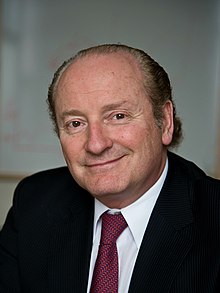Robert C. Merton | |
|---|---|
 Merton in 2010 | |
| Born | Robert Cox Merton July 31, 1944 New York City, New York, U.S. |
| Alma mater | Columbia University California Institute of Technology Massachusetts Institute of Technology |
| Known for | Black–Scholes–Merton model ICAPM Merton's portfolio problem Merton model Fractional Finance Long-Term Capital Management |
| Father | Robert K. Merton |
| Awards | Nobel Memorial Prize in Economic Sciences (1997) |
| Scientific career | |
| Fields | Finance, economics |
| Institutions | Massachusetts Institute of Technology Harvard University |
| Doctoral advisor | Paul Samuelson |
| Doctoral students | Jonathan E. Ingersoll[1] Robert Jarrow |
Robert Cox Merton (born July 31, 1944) is an American economist, Nobel Memorial Prize in Economic Sciences laureate, and professor at the MIT Sloan School of Management, known for his pioneering contributions to continuous-time finance, especially the first continuous-time option pricing model, the Black–Scholes–Merton model.[2][3][4] In 1997 Merton together with Myron Scholes were awarded the Bank of Sweden Prize in Economic Sciences in Memory of Alfred Nobel for the method to determine the value of derivatives.[5][6]
Merton was on the board of directors of Long-Term Capital Management (LTCM), a highly leveraged hedge fund that collapsed in 1998, wiping out most of the value paid in by the investors, and requiring a $3.6 billion bailout from a group of 14 banks, in a deal brokered and put together by the Federal Reserve Bank of New York.[7]
Merton's current research focus is on the topics of lifecycle investing[8] and retirement funding,[9] measuring and monitoring systemic risks in macrofinance,[10] and financial innovation coupled with changing dynamics in financial institutions.[11]
- ^ Ingersoll, Jonathan E. (1976), A contingent-claims valuation of convertible bonds and the optimal policies for call and conversion. Ph.D. dissertation, Massachusetts Institute of Technology.
- ^ Cite error: The named reference
Bodiewas invoked but never defined (see the help page). - ^ Lo, Andrew W. (November 1, 2020). "Robert C. Merton: The First Financial Engineer". Annual Review of Financial Economics. 12 (1): 1–18. doi:10.1146/annurev-financial-042720-055018. ISSN 1941-1367. S2CID 225533917.
- ^ Carr, Peter (2006). "Harvard's Financial Scientist" (PDF). Bloomberg Markets. No. October. pp. 166–169. Retrieved March 27, 2023.
- ^ Cite error: The named reference
nobelprize.orgwas invoked but never defined (see the help page). - ^ "The Permanent Exhibit - Option Pricing in Theory & Practice: The Nobel Prize Research of Robert C. Merton - Exhibits - Historical Collections - Harvard Business School". Harvard Business School. Retrieved March 25, 2023.
- ^ "Too Interconnected to Fail?" (PDF).
- ^ Bodie, Zvi (2003). "Thoughts on the Future: Life-Cycle Investing in Theory and Practice". Financial Analysts Journal. 59 (1): 24–29. doi:10.2469/faj.v59.n1.2500. ISSN 0015-198X. JSTOR 4480448. S2CID 218511875. Retrieved March 27, 2023.
- ^ Pechter, Kerry (January 28, 2021). "How to Solve the World's Retirement Crisis". Retirement Income Journal. Retrieved March 27, 2023.
- ^ Gray, Dale F.; Merton, Robert C.; Bodie, Zvi (November 2007). "New Framework for Measuring and Managing Macrofinancial Risk and Financial Stability". Working Paper Series. National Bureau of Economic Research. doi:10.3386/w13607. S2CID 166791735. Retrieved March 27, 2023.
{{cite journal}}: Cite journal requires|journal=(help) - ^ "Robert C. Merton". MIT Sloan. Retrieved March 25, 2023.